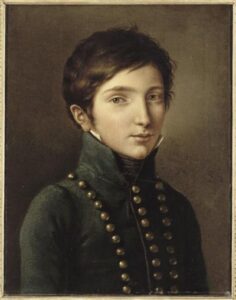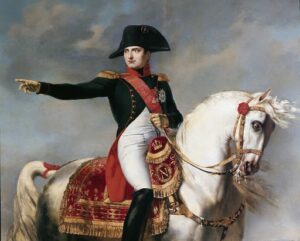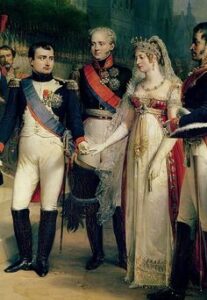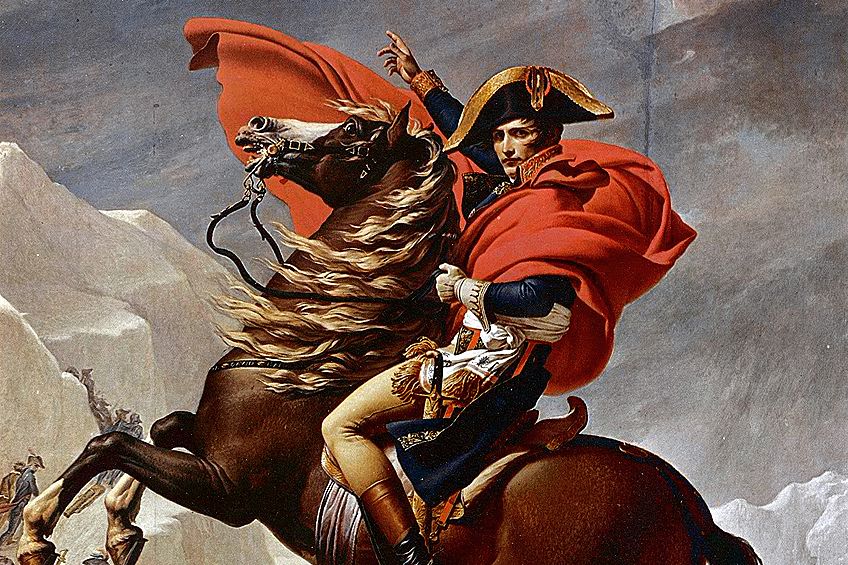Biography
Napoleon Bonaparte was a brilliant commander, diplomat, had excellent intelligence, phenomenal memory and amazing performance. An entire era is named after him, and his deeds came as a shock to most of his contemporaries. His military strategies are in textbooks, and the norms of democracy in Western countries are based on “Napoleonic Law.”The role of this outstanding personality in the history of France is ambiguous. In Spain and Russia he was called the Antichrist, and some researchers consider Napoleon a somewhat embellished hero.
Childhood and youth:
The brilliant commander, statesman, Emperor Napoleon I Bonaparte was a native of Corsica. Born on August 15, 1769 in the city of Ajaccio into a poor noble family. The parents of the future emperor had eight children. Father Carlo di Buonaparte practiced law, mother Letizia, née Ramolino, raised the children. They were Corsicans by nationality. Bonaparte is the Tuscan version of the surname of the famous Corsican.He was taught literacy and sacred history at home, at the age of six he was sent to a private school, and at the age of ten he was sent to Autun College, where the boy did not stay long. After college, Brienne continues her studies at military school. In 1784 he entered the Paris Military Academy. Upon graduation, he received the rank of lieutenant and from 1785 served in the artillery.
In his early youth, Napoleon lived in solitude and was interested in literature and military affairs. In 1788, while in Corsica, he participated in the development of defensive fortifications, worked on a report on the organization of the militia, etc. He considered literary works to be of paramount importance and hoped to become famous in this field.He reads with interest books on history, geography, the size of government revenues in European countries, works on the philosophy of legislation, and is interested in the ideas of Jean-Jacques Rousseau and Abbot Raynal. He writes the history of Corsica, the stories “Conversation of Love”, “The Prophet in Disguise”, “The Earl of Essex” and keeps a diary.
The works of young Bonaparte, with the exception of one, remained in manuscripts. In these works, the author expresses negative emotions towards France, considering it the enslaver of Corsica, and love for his homeland. The recordings of the young Napoleon are political in tone and permeated with a revolutionary spirit.
Young Napoleon:
Napoleon Bonaparte greeted the French Revolution with enthusiasm, and in 1792 he joined the Jacobin Club. After the victory over the British for the capture of Toulon in 1793, he was awarded the rank of brigadier general. This becomes a turning point in his biography, after which a brilliant military career begins.
In 1795, Napoleon distinguished himself during the dispersal of the royalist rebellion, after which he was appointed commander of the army. The Italian campaign undertaken in 1796-1797 under his command demonstrated the talent of the commander and glorified him throughout the continent. In 1798-1799, the Directory sent him on a long-distance military expedition to Syria and Egypt.
The expedition ended in defeat, but it was not considered a failure. He voluntarily leaves the army to fight the Russians under the command of Suvorov. In 1799, General Napoleon Bonaparte returned to Paris. The Directory regime at this time was already at the peak of the crisis.
Domestic policy:
After the coup and the proclamation of the consulate in 1802, he became consul, and in 1804 – emperor. In the same year, with the participation of Napoleon, a new Civil Code was published, based on Roman law.The internal policy pursued by the emperor is aimed at strengthening his own power, which, in his opinion, guaranteed the preservation of the gains of the revolution. Carries out reforms in the field of law and administration. He undertook a number of reforms in the legal and administrative spheres. Some of these innovations still form the basis of the functioning of states. Napoleon ended anarchy. A law was passed to ensure the right to property. French citizens were recognized as equal in rights and opportunities.
Mayors were appointed to cities and villages, and the French Bank was created. The economy began to revive, which could not but please even the poor. Military recruitment allowed the poor to earn money. Lyceums opened throughout the country. At the same time, the police network expanded, a secret department began operating, and the press was subjected to strict censorship. Gradually there was a return to the monarchical system of government.
An important event for the French government was the agreement concluded with the Pope, thanks to which the legitimacy of Bonaparte’s power was recognized in exchange for the proclamation of Catholicism as the main religion of the majority of citizens. Society was divided into two camps in relation to the emperor. Some citizens stated that Napoleon betrayed the revolution, but Bonaparte himself believed that he was a successor of its ideas.
Foreign policy:
The beginning of Napoleon’s reign occurred at a time when France was at war with Austria and England. The new victorious Italian campaign eliminated the threat at the French borders. The result of military action was the subjugation of almost all European countries. In territories not included in France, kingdoms subordinate to the emperor were created, the rulers of which were members of his family. Russia, Prussia and Austria form an alliance.At first, Napoleon was perceived as the savior of his homeland. The people were proud of his achievements, and there was a national upsurge in the country. But the 20-year war tired everyone. The Continental Blockade proclaimed by Bonaparte, which led to the decline of the English economy and its light industry, forced the British to stop trade relations with European states. The crisis hit the port cities of France; the supply of colonial goods, to which Europe had already become accustomed, was stopped. Even the Frencch court suffered from a lack of coffee, sugar, and tea.
The situation was worsened by the economic crisis of 1810. The bourgeoisie did not want to spend money on wars, since the threat of attack by other countries was a thing of the past. She understood that the goal of the emperor’s foreign policy was to expand his own power and protect the interests of the dynasty.
The Collapse Of Empire:
The collapse of the empire began in 1812, when Russian troops defeated Napoleonic army. The creation of an anti-French coalition, which included Russia, Austria, Prussia and Sweden, in 1814 was the collapse of the empire. This year she defeated the French and entered Paris.
Napoleon during the war with Russia
Napoleon had to abdicate the throne, but he retained the status of emperor. He was exiled to the island of Elba in the Mediterranean Sea. However, the exiled emperor did not stay there long.
French citizens and military personnel were unhappy with the situation and feared the return of the Bourbons and nobility. Bonaparte escapes and on March 1, 1815, moves to Paris, where he is greeted with enthusiastic exclamations from the townspeople. Hostilities resume. This period went down in history as the “Hundred Days”. The final defeat of Napoleon’s army occurred on June 18, 1815 after the Battle of Waterloo.
Deposed Emperor Napoleon Bonaparte:
The deposed emperor was captured by the British and sent into exile again. This time he ended up in the Atlantic Ocean on the island of St. Elena, where he lived for another 6 years. But not all Englishmen had a negative attitude towards Napoleon. In 1815, George Byron, impressed by the fate of the deposed emperor, created the “Napoleonic Cycle” of five poems, after which the poet was reproached for being unpatriotic. Among the British there was another fan of Napoleon – Princess Charlotte, the daughter of the future George IV, on whose support the emperor at one time counted, but she died in 1817 during childbirth.
Personal life:
From a young age, Napoleon Bonaparte was distinguished by his amorousness. Contrary to popular belief, Napoleon’s height was above average by the standards that existed in those years – 168 cm, which could not help but attract the attention of the opposite sex. His masculine features and posture, which are visible in the reproductions presented in the form of photographs, aroused the interest of the ladies around him.
The first lover to whom the young man proposed was 16-year-old Desiree-Evgenia-Clara. But at that time his career in Paris began to develop rapidly, and Napoleon could not resist the charm of Parisian women. In the capital of France, Bonaparte preferred to have affairs with older women.
Marriage:
An important event in Napoleon’s personal life, which took place in 1796, was his marriage to Josephine Beauharnais. Bonaparte’s beloved turned out to be 6 years older than him. She was born into a plantation family on the island of Martinique in the Caribbean. From the age of 16 she was married to Viscount Alexandre de Beauharnais and gave birth to two children. Six years after marriage, she divorced her husband and at one time lived in Paris, then in her father’s house. After the revolution of 1789 she again went to France. In Paris, she was supported by her ex-husband, who by that time occupied a high political position. But in 1794 the Viscount was executed, and Josephine herself spent some time in prison.

A year later, having miraculously gained freedom, Josephine met Bonaparte, who was not yet so famous. According to some reports, at the time of their acquaintance she was in a love affair with the then ruler of France, Barras, but this did not prevent him from becoming a witness at the wedding of Bonaparte and Josephine. In addition, Barras granted the groom the position of commander of the Italian Army of the Republic.Researchers claim that the lovers had many things in common. Both were born far from France on small islands, experienced hardships, were imprisoned, both were dreamers. After the wedding, Napoleon went to the positions of the Italian army, and Josephine remained in Paris. After the Italian campaign, Bonaparte was sent to Egypt. Josephine still did not follow her husband, but enjoyed social life in the capital of France.
Tormented by jealousy, Napoleon began to have favorites. According to researchers, Napoleon had from 20 to 50 lovers. A series of novels followed, which led to the emergence of illegitimate heirs. Two are known: Alexander Colonna-Walewski and Charles Leon. The Colonna-Walewski family has survived to this day. Alexander’s mother was the daughter of a Polish aristocrat, Maria Valevskaya.
Women of Napoleon Bonaparte :
Josephine could not have children, so in 1810 Napoleon divorced her. Initially, Bonaparte planned to become related to the Romanov imperial family. He asked Anna Pavlovna’s hand in marriage from her brother Alexander I. But the Russian emperor did not want to become related to a ruler of non-royal blood. In many ways, these disagreements influenced the cooling of relations between France and Russia. Napoleon marries the daughter of the Emperor of Austria, Marie-Louise, who gave birth to an heir in 1811. This marriage was not approved by the French public.
Ironically, it was Josephine’s grandson, and not Napoleon’s, who later became the French emperor. Her descendants reign in Denmark, Belgium, Norway, Sweden and Luxembourg. There are no descendants of Napoleon left, since his son had no children, and he himself died young.
After being deported to the island of Elba, Bonaparte expected to see his legal wife next to him, but Marie-Louise went to her father’s domain. Maria Valevskaya arrived to Bonaparte with her son. Returning to France, Napoleon dreamed of seeing only Marie Louise, but the emperor never received an answer to all the letters sent to Austria.
Death:
After the defeat at Waterloo, Bonaparte whiled away his time on the island of St. Elena. The last years of his life were filled with suffering from an incurable disease. On May 5, 1821, Napoleon I Bonaparte died, he was 52 years old.
According to one version, the cause of death was oncology, according to another – arsenic poisoning. Researchers who support the version of stomach cancer appeal to the results of the autopsy, as well as to the heredity of Bonaparte, whose father died of stomach cancer. Other historians mention that Napoleon gained weight before his death. And this became an indirect sign of arsenic poisoning, since cancer patients lose weight. In addition, traces of high concentrations of arsenic were later found in the emperor’s hair.
According to Napoleon’s will, his remains were transported to France in 1840, where they were reburied in the Parisian Invalides on the grounds of the cathedral. Around the tomb of the former French emperor are sculptures made by Jean-Jacques Pradier.
Memory:
The memory of the exploits of Napoleon Bonaparte is captured in art. Among them are the opuses of Ludwig van Beethoven, Hector Berlioz, Robert Schumann, literary works of Fyodor Dostoevsky, Leo Tolstoy, Rudyard Kipling. In cinema, his image is captured in films of different eras, starting with silent films. A genus of trees growing on the African continent is named after the commander, as well as a culinary masterpiece – a layer cake with cream. Napoleon’s letters were published in France under Napoleon III and were sorted into quotations.
